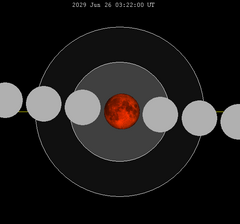May 1939 lunar eclipse

A total lunar eclipse took place on Wednesday, May 3, 1939. A shallow total eclipse saw the Moon in relative darkness for 1 hour and 2 minutes. The Moon was 18% of its diameter into the Earth's umbral shadow, and should have been significantly darkened. The partial eclipse lasted for 3 hours and 27 minutes in total.
Visibility
[edit]Related lunar eclipses
[edit]| Ascending node | Descending node | |||||
|---|---|---|---|---|---|---|
| Saros | Date viewing |
Type chart |
Saros | Date viewing |
Type chart | |
| 110 | 1937 May 25
|
Penumbral
|
115 | 1937 Nov 18
|
Partial
| |
| 120 | 1938 May 14
|
Total
|
125 | 1938 Nov 07
|
Total
| |
| 130 | 1939 May 03
|
Total
|
135 | 1939 Oct 28
|
Partial
| |
| 140 | 1940 Apr 22
|
Penumbral
|
145 | 1940 Oct 16
|
Penumbral
| |
Saros series
[edit]Lunar saros series 130, repeating every 18 years and 11 days, has a total of 71 lunar eclipse events including 56 umbral lunar eclipses (42 partial lunar eclipses and 14 total lunar eclipses). Solar Saros 137 interleaves with this lunar saros with an event occurring every 9 years 5 days alternating between each saros series.
| Greatest | First | |||
|---|---|---|---|---|
 The greatest eclipse of the series will occur on 2029 Jun 26, lasting 102 minutes.[1] |
Penumbral | Partial | Total | Central |
| 1416 Jun 10 | 1560 Sep 4 | 1921 Apr 22
|
1957 May 13
| |
| Last | ||||
| Central | Total | Partial | Penumbral | |
2083 Jul 29
|
2155 Sep 11 | 2552 May 10 | 2678 Jul 26 | |
| 1903 Apr 12 | 1921 Apr 22 | 1939 May 3 | |||

|

|

|

|

|

|
| 1957 May 13 | 1975 May 25 | 1993 Jun 4 | |||

|

|

|

|

|

|
| 2011 Jun 15 | 2029 Jun 26 | 2047 Jul 7 | |||

|

|

|

|

|

|
| 2065 Jul 17 | 2083 Jul 29 | ||||

|

|

|

| ||
Inex series
[edit]The inex series repeats eclipses 20 days short of 29 years, repeating on average every 10571.95 days. This period is equal to 358 lunations (synodic months) and 388.5 draconic months. Saros series increment by one on successive Inex events and repeat at alternate ascending and descending lunar nodes.
This period is 383.6734 anomalistic months (the period of the Moon's elliptical orbital precession). Despite the average 0.05 time-of-day shift between subsequent events, the variation of the Moon in its elliptical orbit at each event causes the actual eclipse time to vary significantly. It is a part of Lunar Inex series 35.
| Descending node | Ascending node | Descending node | Ascending node | ||||
|---|---|---|---|---|---|---|---|
| Saros | Date Chart |
Saros | Date Chart |
Saros | Date Chart |
Saros | Date Chart |
| 115 | 1505 Feb 18
|
116 | 1534 Jan 30
|
117 | 1563 Jan 9 | 118 | 1591 Dec 30 |
| 119 | 1620 Dec 9 | 120 | 1649 Nov 19 | 121 | 1678 Oct 29 | 122 | 1707 Oct 11 |
| 123 | 1736 Sep 20 | 124 | 1765 Aug 30 | 125 | 1794 Aug 11 | 126 | 1823 Jul 23 |
| 127 | 1852 Jul 1 | 128 | 1881 Jun 12 | 129 | 1910 May 24
|
130 | 1939 May 3
|
| 131 | 1968 Apr 13
|
132 | 1997 Mar 24
|
133 | 2026 Mar 3
|
134 | 2055 Feb 11
|
| 135 | 2084 Jan 22
|
136 | 2113 Jan 2 | 137 | 2141 Dec 13 | 138 | 2170 Nov 23 |
| 139 | 2199 Nov 2 | 140 | 2228 Oct 14 | 141 | 2257 Sep 24 | 142 | 2286 Sep 3 |
| 143 | 2315 Aug 16 | 144 | 2344 Jul 26 | 145 | 2373 Jul 5 | 146 | 2402 Jun 16 |
| 147 | 2431 May 27 | 148 | 2460 May 5
|
149 | 2489 Apr 16
| ||
Half-Saros cycle
[edit]A lunar eclipse will be preceded and followed by solar eclipses by 9 years and 5.5 days (a half saros).[2] This lunar eclipse is related to two solar eclipses of Solar Saros 137.
| April 28, 1930 | May 9, 1948 |
|---|---|

|

|
See also
[edit]Notes
[edit]- ^ Listing of Eclipses of cycle 130
- ^ Mathematical Astronomy Morsels, Jean Meeus, p.110, Chapter 18, The half-saros
External links
[edit]- 1939 May 03 chart Eclipse Predictions by Fred Espenak, NASA/GSFC




